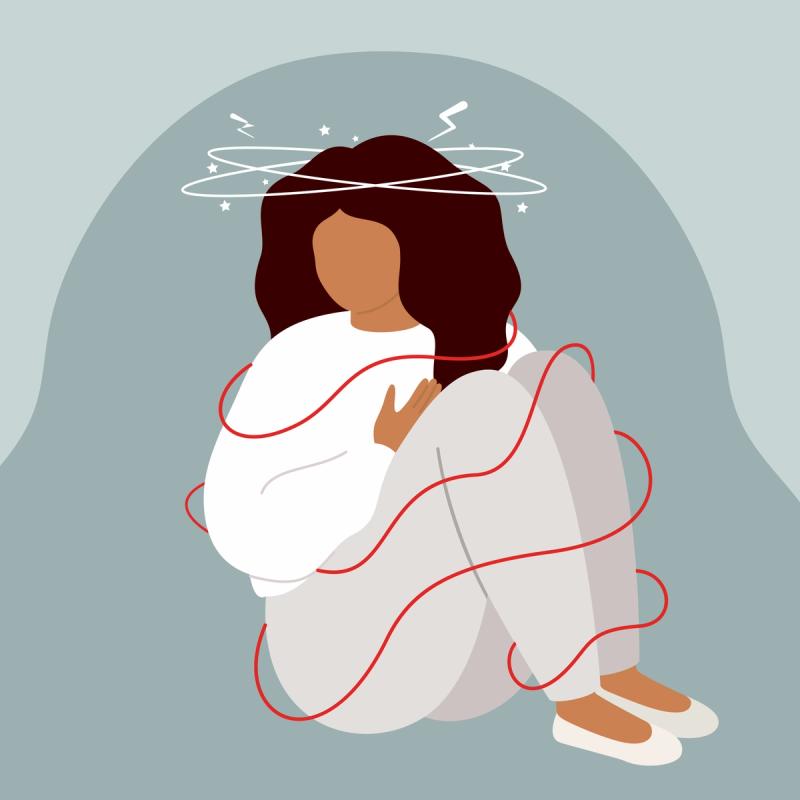Symptoms of a panic attack and an anxiety attack can make them difficult to tell apart. Both are types of anxiety disorders that can negatively impact your life if left untreated. Just over 300 million people in the world have been diagnosed with an anxiety disorder, so you are not alone if you struggle, too.1
The first step to finding treatment that works for you is understanding whether your symptoms are a panic attack or an anxiety attack. From there, you can pursue treatment options to help relieve your symptoms and get you back on the right track.
Learn about the similarities and differences between a panic attack and an anxiety attack.
Key Takeaways
Panic attacks involve a sudden surge of intense fear or discomfort with physical symptoms like a racing heart or shortness of breath. They can occur without a clear trigger.
Anxiety attacks are not an official medical diagnosis, but the term is often used to describe a build-up of worry or fear in response to stress or perceived danger.
One major difference is timing. Panic attacks are abrupt and peak within minutes, while anxiety tends to build gradually over time.
A mental health provider can help assess your symptoms and recommend treatment options, such as therapy or medication, based on the pattern and severity of your experiences.
What is a panic attack?
A panic attack is a sudden onset of intense fear that triggers intense and uncomfortable physical responses when no real threat is present. The attacks are not life-threatening, but can feel like dying or having a heart attack. Those who suffer from frequent panic attacks can experience a negative impact on their quality of life.2
The cause of panic attacks is unknown; however, some of the following factors could play a role:3
Genetics.
A sensitive disposition or temperament.
Major stress.
Certain changes in brain function.
Panic attacks most often begin in young adulthood and occur more often in women than men. There are also certain risk factors for panic attacks, including:4
Family history of panic attacks or panic disorder.
Major life stress such as the death of a loved one.
A traumatic event, such as an assault or an accident.
Major life changes such as a divorce or a baby.
Smoking or excessive caffeine intake.
History of childhood physical or sexual abuse.
What is an anxiety attack?
An anxiety attack is an intense and persistent feeling of worry, often accompanied by physical symptoms.5 The underlying cause of anxiety attacks or disorders is not fully understood. However, they are often a symptom of a mental health condition or a traumatic event. An anxiety attack can also be triggered by an underlying medical condition, including:6
Heart disease.
Diabetes.
Thyroid problems.
Respiratory disorders (COPD, asthma).
Drug misuse or withdrawal.
Withdrawal from alcohol, anti-anxiety medications (benzodiazepines) or other medications.
Chronic pain.
Irritable bowel syndrome (IBS).
Rare tumors.
Risk factors for anxiety attacks or disorders include:7
Trauma.
Stress.
Personality.
Mental health disorders.
Family history of anxiety.
Drug or alcohol abuse.
How do signs and symptoms compare for panic attacks and anxiety attacks?
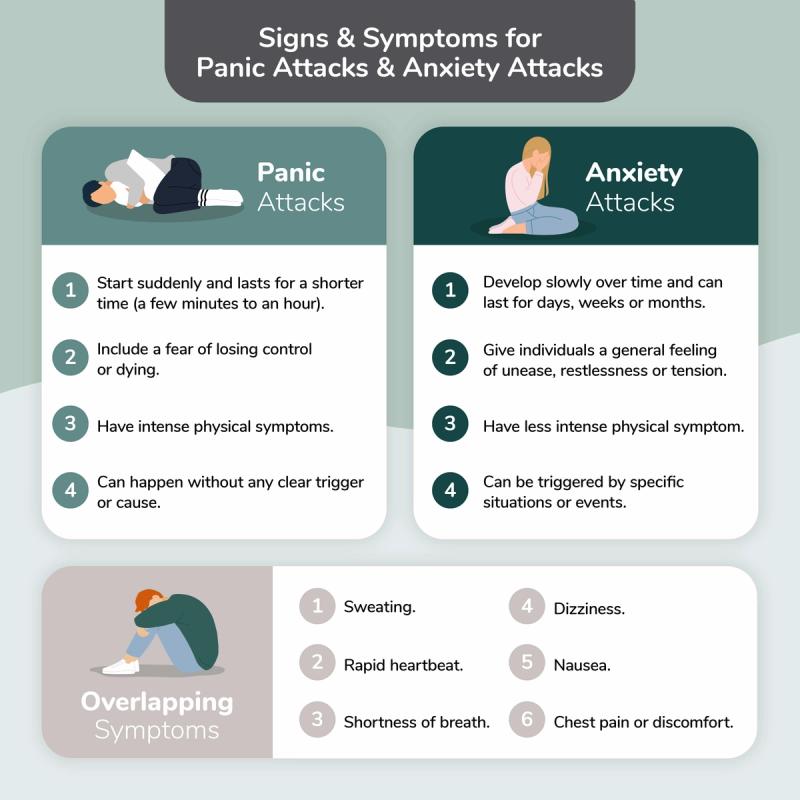
You may have a similar experience with a panic attack and an anxiety attack. The key difference is that panic attacks have a sudden onset of symptoms, often with no clear cause. Anxiety attack symptoms come on slower and are usually persistent.
Overlapping symptoms of anxiety attacks and panic attacks include:8
Sweating.
Rapid heartbeat.
Shortness of breath.
Dizziness.
Nausea.
Chest pain or discomfort
The key indicators or symptoms of a panic attack include:
Starts suddenly and lasts for a shorter time (a few minutes to an hour).
Has intense physical symptoms.
Includes a fear of losing control or dying.
Can happen without any clear trigger or cause.
Anxiety attacks differ from panic attacks in that they:
Develop slowly over time and can last for days, weeks or months.
Give individuals a general feeling of unease, restlessness or tension.
Have less intense physical symptoms.
Can be triggered by specific situations or events.
How long do panic attacks and anxiety attacks last?
Panic attacks come on suddenly and generally peak within a few minutes. They can last anywhere from a few minutes to an hour. Anxiety attacks build up more slowly and can last for days, weeks or months.9
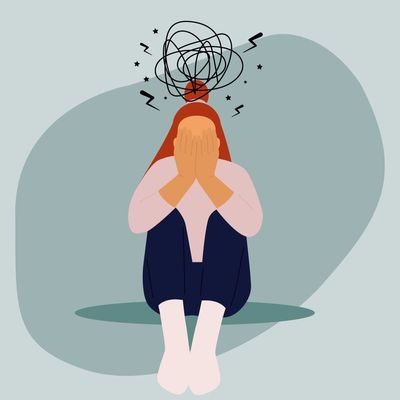
Your mental health is important.
Get personalized panic or anxiety attack treatment online when you need it – we offer a flat rate doctor consult, no membership fees, and low-cost prescriptions.
Get StartedWhat are treatment options for panic attacks and anxiety attacks?
Treatment options for panic attacks and anxiety attacks include therapy, medication, lifestyle changes and relaxation techniques. Some treatments are acute to help within the moment and others are preventative.
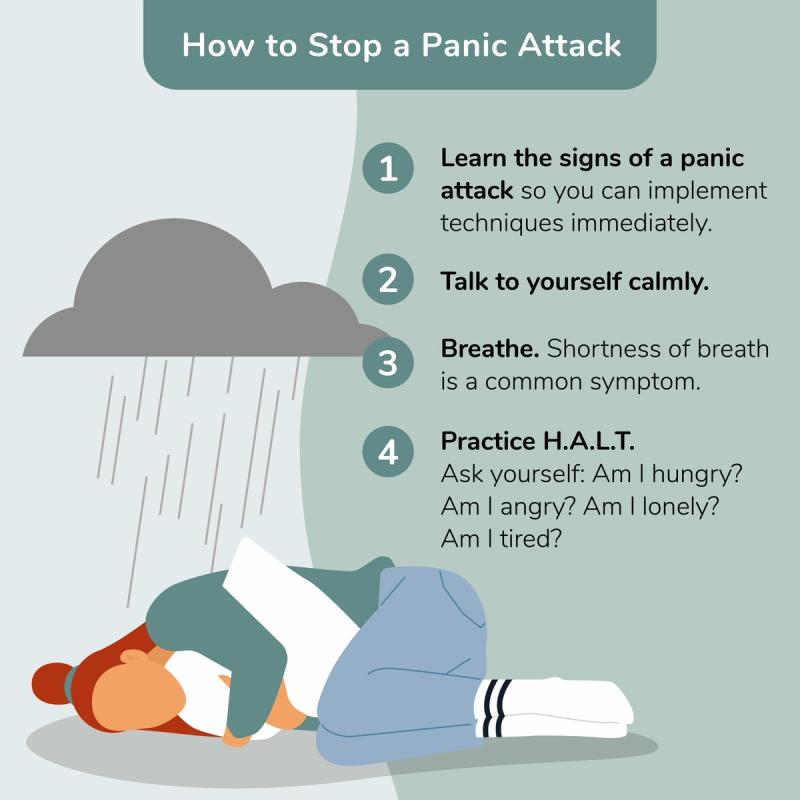
How to Stop a Panic Attack
During a panic attack, these techniques could help you distract yourself until you calm down:10
Learn the signs of a panic attack to implement techniques immediately.
Talk to yourself calmly. Try saying things like “I’m not in danger.” or “This will pass.”
Breathe. Shortness of breath is a common symptom. Try taking deeper, slower breaths until you feel the panic subside.
Practice H.A.L.T. This acronym can help you identify if you are being triggered by one of your unmet needs. Ask yourself: Am I hungry? Am I angry? Am I lonely? Am I tired?
How to Stop an Anxiety Attack
The best defense against an anxiety attack is to distract yourself from the symptoms with a technique that brings you into the present moment. Several of the methods that work for panic attacks could also be useful for anxiety attacks. Try redirecting your focus to:11
An object, like something from your surroundings.
A phrase or mantra (I am safe, e.g.).
Your senses (I see, I smell, I hear, etc.).
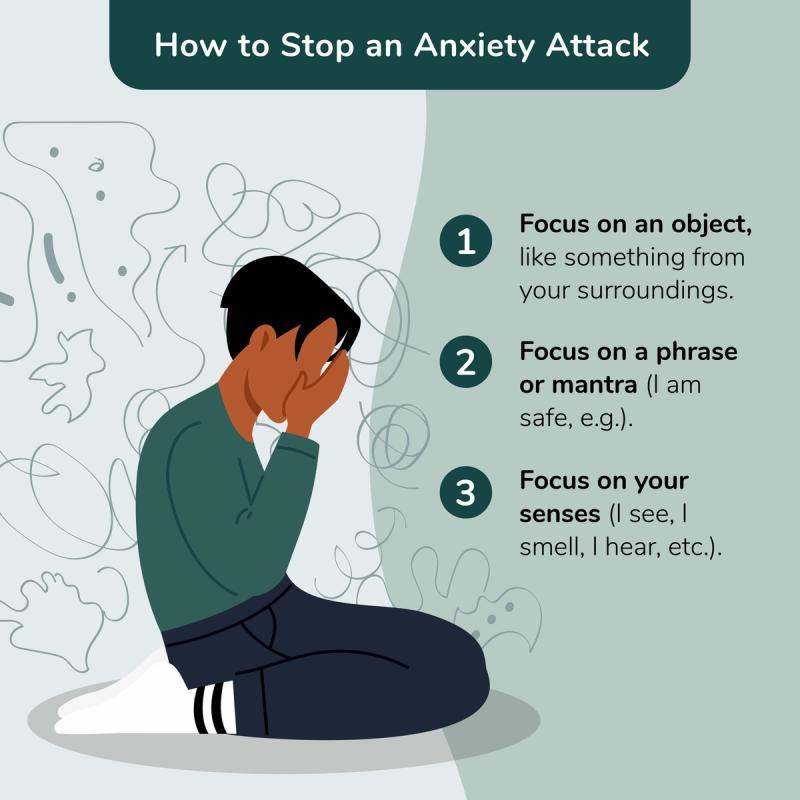
Medication Treatments for a Panic Attack
Medication can be an effective treatment for both the short- and long-term treatment of panic attacks. Most medications treat the underlying anxiety while others can help ease panic symptoms in the moment. Commonly prescribed medication for panic attacks include:12
Selective serotonin reuptake inhibitors (SSRIs):
Serotonin and norepinephrine reuptake inhibitors (SNRIs):
Benzodiazepines:
Alprazolam (Xanax®)
Clonazepam (Klonopin®)
Medication Treatments for an Anxiety Attack
Medication treatment for anxiety attacks includes many of the same options as panic attacks with some differences. Medications for anxiety attacks include:13
SSRIs:
Fluvoxamine (Luvox®)
SNRIs:
Tricyclic antidepressants (TCAs):
Amitriptyline (Elavil®)
Imipramine (Tofranil®)
Nortriptyline (Pamelor®)
Benzodiazepines:
Alprazolam (Xanax®)
Chlordiazepoxide (Librium®)
Diazepam (Valium®)
Lorazepam (Ativan®)
Lifestyle Changes for Panic and Anxiety Attacks
Certain lifestyle changes can help with the symptoms and prevention of both panic and anxiety attacks, including:14
Join a support group.
Avoid caffeine, alcohol, smoking and recreational drugs.
Practice stress management and relaxation techniques.
Get regular physical activity.
Get sufficient sleep.
How to Help Someone Who’s Having a Panic Attack
The best thing you can do for someone experiencing a panic attack is to:15
Stay calm.
Stay with them.
Do your best to be understanding, positive and encouraging.
Panic Attack vs. Anxiety Attack Comparison Chart
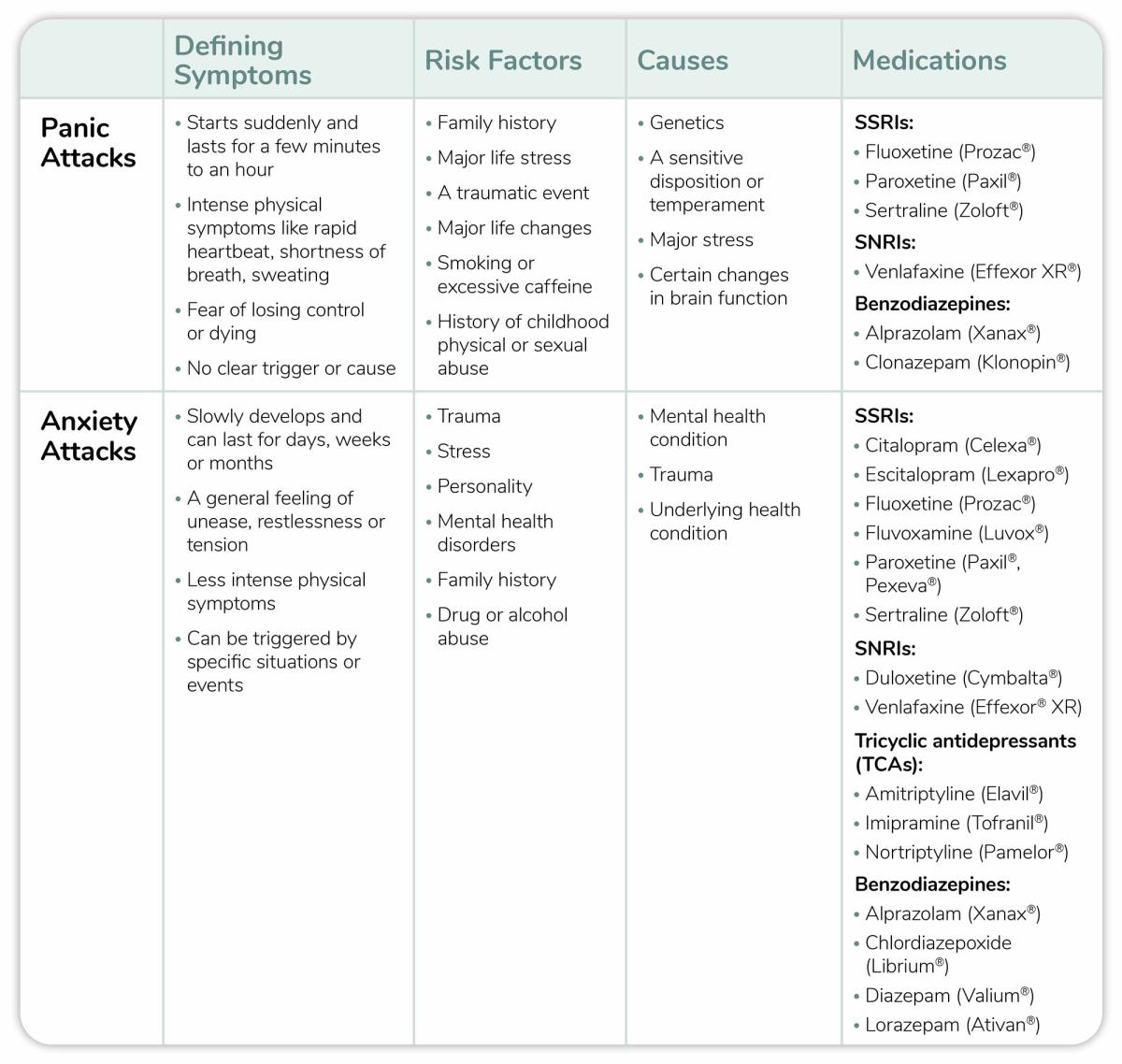
How RedBox Rx can help
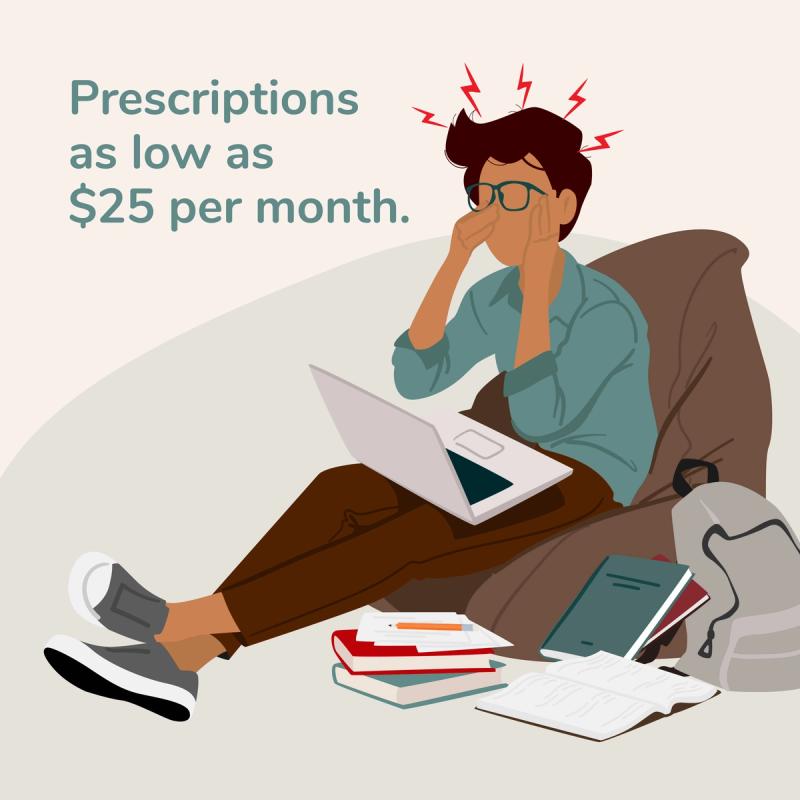
RedBox Rx makes receiving prescription medication for anxiety attacks and panic attacks easy and affordable.
Benefits of RedBox Rx include:
No membership or subscription fees.
Low-cost $35 telehealth consult with a licensed medical provider.
Medications for $25 per month (with purchase of three-month supply).
Confidential, private and secure.
Free standard shipping or expedited/overnight available.
Get started with your personalized treatment plan for anxiety attacks or panic attacks.

